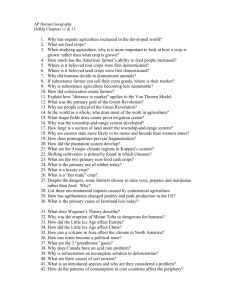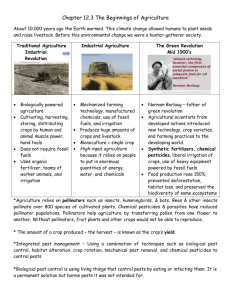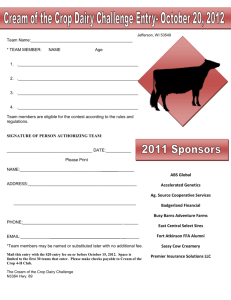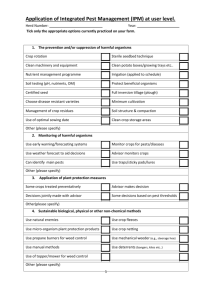2014 CSS 1900 Syllabus
advertisement
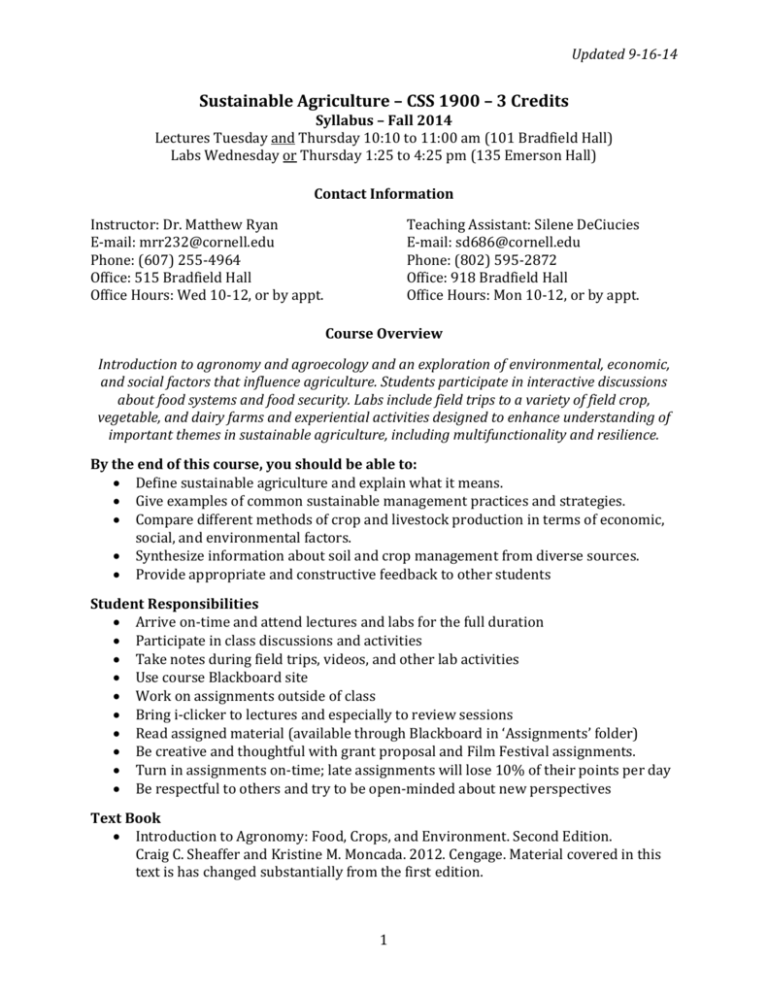
Updated 9-16-14 Sustainable Agriculture – CSS 1900 – 3 Credits Syllabus – Fall 2014 Lectures Tuesday and Thursday 10:10 to 11:00 am (101 Bradfield Hall) Labs Wednesday or Thursday 1:25 to 4:25 pm (135 Emerson Hall) Contact Information Instructor: Dr. Matthew Ryan E-mail: mrr232@cornell.edu Phone: (607) 255-4964 Office: 515 Bradfield Hall Office Hours: Wed 10-12, or by appt. Teaching Assistant: Silene DeCiucies E-mail: sd686@cornell.edu Phone: (802) 595-2872 Office: 918 Bradfield Hall Office Hours: Mon 10-12, or by appt. Course Overview Introduction to agronomy and agroecology and an exploration of environmental, economic, and social factors that influence agriculture. Students participate in interactive discussions about food systems and food security. Labs include field trips to a variety of field crop, vegetable, and dairy farms and experiential activities designed to enhance understanding of important themes in sustainable agriculture, including multifunctionality and resilience. By the end of this course, you should be able to: Define sustainable agriculture and explain what it means. Give examples of common sustainable management practices and strategies. Compare different methods of crop and livestock production in terms of economic, social, and environmental factors. Synthesize information about soil and crop management from diverse sources. Provide appropriate and constructive feedback to other students Student Responsibilities Arrive on-time and attend lectures and labs for the full duration Participate in class discussions and activities Take notes during field trips, videos, and other lab activities Use course Blackboard site Work on assignments outside of class Bring i-clicker to lectures and especially to review sessions Read assigned material (available through Blackboard in ‘Assignments’ folder) Be creative and thoughtful with grant proposal and Film Festival assignments. Turn in assignments on-time; late assignments will lose 10% of their points per day Be respectful to others and try to be open-minded about new perspectives Text Book Introduction to Agronomy: Food, Crops, and Environment. Second Edition. Craig C. Sheaffer and Kristine M. Moncada. 2012. Cengage. Material covered in this text is has changed substantially from the first edition. 1 Updated 9-16-14 Fall 2014 Lecture Schedule for CSS 1900 Tuesday and Thursday, 10:10 to 11:00 am (101 Bradfield Hall) Date 26-Aug 28-Aug 2-Sep 4-Sep Topic Introduction Sustainable Agriculture 9-Sep History of Agriculture Iroquois Agriculture and Soil Sustainability (Jane Mt. Pleasant) Crops and Crop Rotation 11-Sep 16-Sep Cropping Systems Soil and Tillage 18-Sep Water in Agriculture 23-Sep 14-Oct 16-Oct 21-Oct 23-Oct Nitrogen and Legumes (Laurie Drinkwater) Exam 1 Foodsheds and Foodprints (Gary Fick) Agroecology Bioenergy (Jerry Cherney) Resources at Mann Library (Ashley Downs) No Lecture – Fall Break Dairy Production (Julio Giordano) Organic Agriculture Genetic Engineering 28-Oct Exam 2 30-Oct Integrated Pest Management (Stephen Young) Permaculture (Steve Gabriel) Perennial Grains Climate Change Cover Crops 25-Sep 30-Sep 2-Oct 7-Oct 9-Oct 4-Nov 6-Nov 11-Nov 13-Nov 18-Nov 20-Nov 25-Nov To be determined Urban Agriculture (Jeff Liebert) Economics of Sustainability (Gary Fick) Assignment Read "SARE: What is Sustainable Agriculture?” Read Chapters 1 (History of Agriculture) and 2 (Agriculture Today) Read Chapter 3 (Feeding the World) Read Chapter 4 (Classifying and Naming Crops) Read Chapters 12 (Soils) and 13 (Cropping Systems) Read 14 (Tillage and Crop Establishment) Read “SARE: Smart Water Use on Your Farm or Ranch” and Chapter 10 (Environment) Read pages 186 to 197 in Chapter 8 (Plant Physiology and Growth) Study for Exam 1 Ithaca Farmers Market Assignment Due Read Chapters 11 (Agroecosystems) Multifunctional Agriculture Assignment Due Read Chapter 18 (Organic Agriculture) Read Chapter 9 (Improving Plants) Cover Crop Assignment Due Read Chapters 15 (Weeds) and 16 (Plant Disease and Insects) Reading to be determined Read “Urban Agriculture: What are some of the obstacles to growing food in cities?” Deadline for loading videos for Film Festival 2 Updated 9-16-14 27-Nov 2-Dec 4-Dec 16-Dec No Lecture – Thanksgiving Holiday Review for Final Exam No Lecture Final Exam (2:00 to 4:30 pm) NE SARE Proposal Due Fall 2014 Laboratory Schedule for CSS 1900 Wednesday or Thursday, 1:25 to 4:25 pm Date Location* Topic Discussion of SARE article, cover crop video, introduce cover crop project, cover crop seeding in field plots Aug 27 and 28 135 Emerson Hall Sep 3 and 4 Cover Crops Continued, introduce assignments Cover crop seeding in greenhouse Sep 10 and 11 Dilmun Hill and McDaniel Nut Grove (~15 minute walk) Student farm tour, organic vegetables, mushroom production, and multifunctional agriculture Sep 17 and 18 Raymond Donald & Sons Farm (~30 minute bus trip) Conventional corn and soybean production Sep 24 and 25 135 Emerson Hall Oct 1 and 2 Oct 8 and 9 Oct 15 and 16 Oct 22 and 23 Oct 29 and 30 Nov 5 and 6 Early Morning Farm (~30 minute bus trip) Cornell Crops Garden (~15 minute walk) Jerry Dell Farm and Freeville Research Farm Oechsner Farm (~30 minute bus trip) Cornell Dairy (~15 minute walk) Finger Lakes Fresh and Food Hub (~20 minute bus trip) Nov 11 and 12 135 Emerson Hall Nov 19 and 20 135 Emerson Hall Nov 26 and 27 Dec 3 and 4 No Lab – Thanksgiving Holiday No Lab – Study Period for Final Watch ‘Fresh’ and introduce SARE grant proposal and film festival assignment Organic vegetable production, community supported agriculture Cover crop harvest, bioenergy crops discussion of food crops Organic dairy, direct marketing, and vegetable research plots Organic small grain production for milling and malting Dairy research at Cornell Hydroponic lettuce production and food distribution Peer-to-peer feedback on videos and NE SARE project 2nd Annual Sustainable Agriculture Film Festival *Note that some field trips are tentative and subject to change 3 Updated 9-16-14 Course grade will be based on: Participation (3%) Field Trips (12%) Ithaca Farmers Market Assignment (5%) Exam 1 (15%) Cover Crop Assignment (5%) Multifunctional Agriculture Assignment (5%) Exam 2 (15%) Film Festival Assignment (10%) NE SARE Grant Proposal Assignment (10%) Final Exam (20%) Score 98-100 94-97 90-93 88-89 84-87 80-83 78-79 74-77 70-73 68-69 64-67 60-63 0-59 Letter Grade A+ A AB+ B BC+ C CD+ D DF Academic integrity: Absolute integrity is expected of every Cornell student in all academic undertakings. Any fraudulent act by a student to advance his or her academic status merits a severe penalty and such cases are governed by the Code of Academic Integrity. A pamphlet titled the Code of Academic Integrity and Acknowledging the Work of Others is available from the office of the dean of faculty, and at www.policy.cornell. edu/Code_of_Academic_Integrity.cfm. 4


